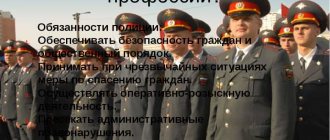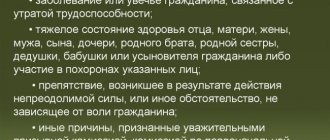What is the difference between a witness and a witness?
The concepts of “understander” and “witness” are very different, despite their similarities. A witness is a person who is invited as a supervisor over the ongoing investigative actions. In this case, the following requirements are imposed on the witness:
- This must be an adult;
- He must have no mental illness;
- He should not be related to executive authorities (either personally or through relatives and friends);
- He should not be interested in the outcome of the case to which he is involved.
In this case, a person becomes a witness on a voluntary basis at the request of executive branch employees.
The main difference between an attesting witness and a witness is that the former monitors the correctness of the investigative actions, and the latter directly monitors the crime. In this case, a witness can be any person who was nearby during the crime, including a relative of a participant in the case, with mental disabilities, a minor, and so on. There are no legal requirements for a witness.
It is important that a witness can become a witness, after which he will have the rights and obligations of individuals with a similar status, which are enshrined in the Criminal Code of the Russian Federation.
A witness can become a witness, for example, if he was called to supervise an inspection of a suspect’s apartment, during which prohibited items (weapons, drugs, stolen items, etc.) were found.
Witness, his procedural position
A witness is a person not interested in the outcome of a criminal case, who is involved by the inquirer, investigator or prosecutor to certify the fact of an investigative action, as well as the content, progress and results of the investigative action (Part 1 of Article 60 of the Code of Criminal Procedure).
Why participation is needed: to certify the correctness of the course and results of investigative actions and thereby confirm the reliability of the evidence obtained.
Reason for participation:
· the presence of certain qualities in an individual that make it possible to attract him as a witness
· the decision of the inquirer, investigator or prosecutor on the need to involve a person in such a capacity, which is reflected in the protocol of the relevant investigative action.
With the participation of at least two witnesses, the:
· inspection (Article 177 of the Code of Criminal Procedure);
· examination of the corpse and exhumation (Article 178 of the Code of Criminal Procedure);
· investigative experiment (Article 181 of the Code of Criminal Procedure)
· search (Article 182 of the Code of Criminal Procedure); seizure (Article 183 of the Code of Criminal Procedure);
· inspection and seizure of postal and telegraph items (part 5 of article 185 of the Code of Criminal Procedure);
· inspection and listening to the phonogram obtained as a result of monitoring and recording of negotiations (part 7 of article 186 of the Code of Criminal Procedure);
· presentation for identification (Article 193 of the Code of Criminal Procedure);
· checking evidence on the spot (Article 194 of the Code of Criminal Procedure).
In accordance with Part 2 of Art. 170 of the Code of Criminal Procedure, witnesses may be involved in participation in other investigative actions if the decision on this is made by the investigator at the request of participants in criminal proceedings or on his own initiative.
Regarding the mandatory participation of witnesses in the law (Part 3 of Article 170 of the Code of Criminal Procedure), there are some exceptions. In hard-to-reach areas, in the absence of proper means of communication, as well as in cases where the implementation of an investigative action is associated with a danger to the life and health of people, investigative actions, in the production of which the participation of witnesses is mandatory, can be carried out without their participation, as indicated in the protocol of the investigative action a corresponding entry is made. In this case, technical means of recording its progress and results are used.
The Code of Criminal Procedure does not contain any special requirements that witnesses must meet. It seems that persons can act as witnesses, with the exception of those listed in Part 2 of Art. 60 Code of Criminal Procedure. The following cannot be witnesses:
· minors;
· participants in criminal proceedings, their close relatives and relatives;
· employees of executive authorities, vested in accordance with federal law with the authority to carry out operational investigative activities and (or) preliminary investigation.
In practice, the following should also not be involved as witnesses:
· incompetent;
· elderly people;
· persons with physical disabilities, if these disabilities do not allow them to correctly perceive information.
The attesting witness has the right:
1. participate in the investigative action and make statements and comments regarding the investigative action that must be entered into the protocol;
2. get acquainted with the protocol of the investigative action in which he participated;
3. bring complaints/against actions (inaction) and decisions of the inquirer, investigator and prosecutor that limit his rights.
As such, the duties of attesting witnesses are not established in the Code of Criminal Procedure, although the forms of the relevant procedural documents contain a column stating that attesting witnesses are explained not only their rights, but also the obligations provided for in Art. 60 Code of Criminal Procedure. It seems that in this case we are talking not about procedural duties, but about the appointment of witnesses. During any investigative action, they must carefully monitor its progress, remember what evidence was obtained, certify with their signature the correctness of the entries made in the protocol, and, if necessary, make statements about violations committed.
It should be borne in mind that a witness can be questioned as a witness regarding the circumstances that became known to him as a result of participation in the investigative action. In this case, he is granted rights and obligations corresponding to the procedural status of the witness (Article 56 of the Code of Criminal Procedure).
Directly in the law (Part 4 of Article 60 of the Code of Criminal Procedure) the only duty of a witness is enshrined - not to disclose the data of the preliminary investigation if he was warned about this in advance in the manner established by Art. 161 Code of Criminal Procedure.
For the disclosure of preliminary investigation data, the witness bears responsibility in accordance with Art. 310 of the Criminal Code of the Russian Federation.
50. Circumstances precluding participation in criminal proceedings. Challenges and the procedure for their resolution.
These circumstances do not depend on the will of the participants, they exist objectively and arise before the moment from which a person acquires a certain procedural status.
Circumstances that exclude participation in criminal proceedings are such external, objectively existing factors, the presence of which raises reasonable doubts about the impartiality of one or another participant in the proceedings, in connection with which he is obliged to withdraw from participation in the proceedings in this criminal case, and in case of failure to comply with this duties are subject to revocation
participants are divided into the following groups:
1) officials of criminal proceedings:
· judge,
· prosecutor,
· investigator,
· investigator (Articles 61-67 of the Code of Criminal Procedure);
They cannot participate if:
· is a victim, civil plaintiff, civil defendant or witness in this criminal case;
· participated as a juror, expert, specialist, translator, witness, secretary of the court session, defense attorney, legal representative of the suspect, accused, representative of the victim, civil plaintiff or civil defendant, and the judge also - as an inquirer, investigator, prosecutor in criminal proceedings this criminal case;
· is a close relative or relative of any of the participants in the proceedings in this criminal case.
As a result of the analysis of these provisions, we can conclude that the circumstances that cause the removal of officials from criminal proceedings are that they have a different procedural status or family relationships with other participants.
· An official cannot carry out criminal proceedings not only in the case where he has already been given a different procedural status, but also in situations where there are factual grounds for this.
· the impossibility of participation of a judge, prosecutor, investigator, inquirer in criminal proceedings also in cases where there are other circumstances to believe that they are personally, directly or indirectly interested in the outcome of this criminal case. It should also be noted that the law creates a “two-stage” design of circumstances excluding the participation of a judge in criminal proceedings. In addition to those listed in Art. 61 of the Code of Criminal Procedure, there are a number of additional grounds causing the inadmissibility of repeated participation of a judge in the consideration of a criminal case. In accordance with Art. 63 of the Code of Criminal Procedure, a judge who took part in the consideration of a criminal case in a court of first instance cannot participate in the consideration of this criminal case in a court of second instance or by way of supervision, as well as participate in a new consideration of a criminal case in a court of first or second instance or by way of supervision in case of cancellation of the sentence passed with his participation, as well as a ruling or resolution to terminate the criminal case.
· A judge who took part in the consideration of a criminal case in a court of second instance cannot participate in the consideration of this criminal case in a court of first instance or by way of supervision, as well as in a new consideration of the same case in a court of second instance after the reversal of a sentence, ruling, decision , made with his participation.
· A judge who took part in the consideration of a criminal case by way of supervision cannot participate in the consideration of the same criminal case in a court of first or second instance.
2) persons representing the interests of other participants:
· defender,
· representative of the victim, civil plaintiff or civil defendant
any of these participants does not have the right to participate in criminal proceedings if he:
· previously participated in the proceedings in this criminal case as a judge, prosecutor, investigator, inquiry officer, court secretary, witness, expert, specialist, translator or attesting witness;
· is a close relative or relative of a judge, prosecutor, investigator, investigator, court secretary who took or is taking part in the proceedings in this criminal case, or a person whose interests conflict with the interests of a participant in criminal proceedings who has entered into an agreement with him to provide protection;
· provides or has previously provided legal assistance to a person whose interests conflict with the interests of the suspect, accused or victim represented by him, civil plaintiff, civil defendant.
Note that the provision enshrined in clause 3 relating to the defender somewhat expands that enshrined in part 6 of Art. 49 of the Code of Criminal Procedure states that the same person cannot be a defense attorney for two suspects or accused if the interests of one of them contradict the interests of the other.
3) participants contributing to the implementation of criminal proceedings:
· secretary of the court session (Article 68 of the Code of Criminal Procedure),
· translator (Article 69 of the Code of Criminal Procedure),
· expert (Article 69 of the Code of Criminal Procedure),
· specialist (Article 71 of the Code of Criminal Procedure).
This group of participants is characterized by the fact that in relation to one of them (the secretary of the court session), the legislator did not at all provide for circumstances excluding his participation in criminal proceedings, while other persons (translator, expert, specialist) cannot take part if their incompetence is revealed. As for the translator, his incompetence is expressed in the lack of fluency in two languages necessary for a qualified translation. A specialist is excluded from participation in the process in cases where he lacks the necessary special knowledge or when he cannot adequately apply it in a specific situation. The incompetence of an expert can be expressed in the absence of both special knowledge and appropriate special education.
Unfortunately, the Code of Criminal Procedure does not provide for the possibility of excluding a witness from the list of participants in criminal proceedings. It seems that a person cannot be used as a witness in the presence of the circumstances listed in Art. 61 of the Code of Criminal Procedure, although there is a gap in the legislation before the corresponding changes are made.
A witness is a person not interested in the outcome of a criminal case, who is involved by the inquirer, investigator or prosecutor to certify the fact of an investigative action, as well as the content, progress and results of the investigative action (Part 1 of Article 60 of the Code of Criminal Procedure).
Why participation is needed: to certify the correctness of the course and results of investigative actions and thereby confirm the reliability of the evidence obtained.
Reason for participation:
· the presence of certain qualities in an individual that make it possible to attract him as a witness
· the decision of the inquirer, investigator or prosecutor on the need to involve a person in such a capacity, which is reflected in the protocol of the relevant investigative action.
With the participation of at least two witnesses, the:
· inspection (Article 177 of the Code of Criminal Procedure);
· examination of the corpse and exhumation (Article 178 of the Code of Criminal Procedure);
· investigative experiment (Article 181 of the Code of Criminal Procedure)
· search (Article 182 of the Code of Criminal Procedure); seizure (Article 183 of the Code of Criminal Procedure);
· inspection and seizure of postal and telegraph items (part 5 of article 185 of the Code of Criminal Procedure);
· inspection and listening to the phonogram obtained as a result of monitoring and recording of negotiations (part 7 of article 186 of the Code of Criminal Procedure);
· presentation for identification (Article 193 of the Code of Criminal Procedure);
· checking evidence on the spot (Article 194 of the Code of Criminal Procedure).
In accordance with Part 2 of Art. 170 of the Code of Criminal Procedure, witnesses may be involved in participation in other investigative actions if the decision on this is made by the investigator at the request of participants in criminal proceedings or on his own initiative.
Regarding the mandatory participation of witnesses in the law (Part 3 of Article 170 of the Code of Criminal Procedure), there are some exceptions. In hard-to-reach areas, in the absence of proper means of communication, as well as in cases where the implementation of an investigative action is associated with a danger to the life and health of people, investigative actions, in the production of which the participation of witnesses is mandatory, can be carried out without their participation, as indicated in the protocol of the investigative action a corresponding entry is made. In this case, technical means of recording its progress and results are used.
The Code of Criminal Procedure does not contain any special requirements that witnesses must meet. It seems that persons can act as witnesses, with the exception of those listed in Part 2 of Art. 60 Code of Criminal Procedure. The following cannot be witnesses:
· minors;
· participants in criminal proceedings, their close relatives and relatives;
· employees of executive authorities, vested in accordance with federal law with the authority to carry out operational investigative activities and (or) preliminary investigation.
In practice, the following should also not be involved as witnesses:
· incompetent;
· elderly people;
· persons with physical disabilities, if these disabilities do not allow them to correctly perceive information.
The attesting witness has the right:
1. participate in the investigative action and make statements and comments regarding the investigative action that must be entered into the protocol;
2. get acquainted with the protocol of the investigative action in which he participated;
3. bring complaints/against actions (inaction) and decisions of the inquirer, investigator and prosecutor that limit his rights.
As such, the duties of attesting witnesses are not established in the Code of Criminal Procedure, although the forms of the relevant procedural documents contain a column stating that attesting witnesses are explained not only their rights, but also the obligations provided for in Art. 60 Code of Criminal Procedure. It seems that in this case we are talking not about procedural duties, but about the appointment of witnesses. During any investigative action, they must carefully monitor its progress, remember what evidence was obtained, certify with their signature the correctness of the entries made in the protocol, and, if necessary, make statements about violations committed.
It should be borne in mind that a witness can be questioned as a witness regarding the circumstances that became known to him as a result of participation in the investigative action. In this case, he is granted rights and obligations corresponding to the procedural status of the witness (Article 56 of the Code of Criminal Procedure).
Directly in the law (Part 4 of Article 60 of the Code of Criminal Procedure) the only duty of a witness is enshrined - not to disclose the data of the preliminary investigation if he was warned about this in advance in the manner established by Art. 161 Code of Criminal Procedure.
For the disclosure of preliminary investigation data, the witness bears responsibility in accordance with Art. 310 of the Criminal Code of the Russian Federation.
50. Circumstances precluding participation in criminal proceedings. Challenges and the procedure for their resolution.
These circumstances do not depend on the will of the participants, they exist objectively and arise before the moment from which a person acquires a certain procedural status.
Circumstances that exclude participation in criminal proceedings are such external, objectively existing factors, the presence of which raises reasonable doubts about the impartiality of one or another participant in the proceedings, in connection with which he is obliged to withdraw from participation in the proceedings in this criminal case, and in case of failure to comply with this duties are subject to revocation
participants are divided into the following groups:
1) officials of criminal proceedings:
· judge,
· prosecutor,
· investigator,
· investigator (Articles 61-67 of the Code of Criminal Procedure);
They cannot participate if:
· is a victim, civil plaintiff, civil defendant or witness in this criminal case;
· participated as a juror, expert, specialist, translator, witness, secretary of the court session, defense attorney, legal representative of the suspect, accused, representative of the victim, civil plaintiff or civil defendant, and the judge also - as an inquirer, investigator, prosecutor in criminal proceedings this criminal case;
· is a close relative or relative of any of the participants in the proceedings in this criminal case.
As a result of the analysis of these provisions, we can conclude that the circumstances that cause the removal of officials from criminal proceedings are that they have a different procedural status or family relationships with other participants.
· An official cannot carry out criminal proceedings not only in the case where he has already been given a different procedural status, but also in situations where there are factual grounds for this.
· the impossibility of participation of a judge, prosecutor, investigator, inquirer in criminal proceedings also in cases where there are other circumstances to believe that they are personally, directly or indirectly interested in the outcome of this criminal case. It should also be noted that the law creates a “two-stage” design of circumstances excluding the participation of a judge in criminal proceedings. In addition to those listed in Art. 61 of the Code of Criminal Procedure, there are a number of additional grounds causing the inadmissibility of repeated participation of a judge in the consideration of a criminal case. In accordance with Art. 63 of the Code of Criminal Procedure, a judge who took part in the consideration of a criminal case in a court of first instance cannot participate in the consideration of this criminal case in a court of second instance or by way of supervision, as well as participate in a new consideration of a criminal case in a court of first or second instance or by way of supervision in case of cancellation of the sentence passed with his participation, as well as a ruling or resolution to terminate the criminal case.
· A judge who took part in the consideration of a criminal case in a court of second instance cannot participate in the consideration of this criminal case in a court of first instance or by way of supervision, as well as in a new consideration of the same case in a court of second instance after the reversal of a sentence, ruling, decision , made with his participation.
· A judge who took part in the consideration of a criminal case by way of supervision cannot participate in the consideration of the same criminal case in a court of first or second instance.
2) persons representing the interests of other participants:
· defender,
· representative of the victim, civil plaintiff or civil defendant
any of these participants does not have the right to participate in criminal proceedings if he:
· previously participated in the proceedings in this criminal case as a judge, prosecutor, investigator, inquiry officer, court secretary, witness, expert, specialist, translator or attesting witness;
· is a close relative or relative of a judge, prosecutor, investigator, investigator, court secretary who took or is taking part in the proceedings in this criminal case, or a person whose interests conflict with the interests of a participant in criminal proceedings who has entered into an agreement with him to provide protection;
· provides or has previously provided legal assistance to a person whose interests conflict with the interests of the suspect, accused or victim represented by him, civil plaintiff, civil defendant.
Note that the provision enshrined in clause 3 relating to the defender somewhat expands that enshrined in part 6 of Art. 49 of the Code of Criminal Procedure states that the same person cannot be a defense attorney for two suspects or accused if the interests of one of them contradict the interests of the other.
3) participants contributing to the implementation of criminal proceedings:
· secretary of the court session (Article 68 of the Code of Criminal Procedure),
· translator (Article 69 of the Code of Criminal Procedure),
· expert (Article 69 of the Code of Criminal Procedure),
· specialist (Article 71 of the Code of Criminal Procedure).
This group of participants is characterized by the fact that in relation to one of them (the secretary of the court session), the legislator did not at all provide for circumstances excluding his participation in criminal proceedings, while other persons (translator, expert, specialist) cannot take part if their incompetence is revealed. As for the translator, his incompetence is expressed in the lack of fluency in two languages necessary for a qualified translation. A specialist is excluded from participation in the process in cases where he lacks the necessary special knowledge or when he cannot adequately apply it in a specific situation. The incompetence of an expert can be expressed in the absence of both special knowledge and appropriate special education.
Unfortunately, the Code of Criminal Procedure does not provide for the possibility of excluding a witness from the list of participants in criminal proceedings. It seems that a person cannot be used as a witness in the presence of the circumstances listed in Art. 61 of the Code of Criminal Procedure, although there is a gap in the legislation before the corresponding changes are made.
What should a witness do?
A citizen of the Russian Federation has the right to refuse an offer from an executive officer to become a witness. It is necessary to carefully analyze the situation in which he will find himself after agreeing to participate in the process. For example, if a citizen is asked to be an attesting witness during a search of an apartment, car or suspect, this process will not take much time. However, if we are talking about breaking into an apartment in which the body of a murdered person may be found, it should be understood that the police will ask you to appear before the investigator or in court several times during the investigation of the case.
During the process to which a witness was involved, he is given the task of monitoring the actions of executive branch employees. The witness must:
- Be aware of what is happening. That is, if law enforcement officers perform actions that are incomprehensible to the witness, you should ask for what purpose they are doing this;
- Insist on entering your observations into the protocol;
- Sign or not sign the protocol only after reading the information included in it.
Important: The witness must understand that the fate of the accused depends on him. You must be extremely careful not to miss illegal actions of law enforcement officers, if any.
Who can become an attesting witness?
Witnesses are ordinary citizens who were invited by investigators to participate in investigative activities . These are completely random and strangers. They are in no way interested in the ongoing investigation .
And they are needed in order to confirm the data obtained during investigative activities. That is, they act as a kind of witnesses. Not just by chance, but by special invitees. And their participation is formalized in documents.
Any person can become a witness. The exception is minor citizens, as well as employees of law enforcement and investigative agencies. You also cannot invite relatives of the participants in the process or other interested parties.
These restrictions are imposed to ensure that all activities are conducted with the utmost fairness and openness . Otherwise, the choice of applicants is not limited in any way. Most often, neighbors or just random passers-by are invited.
Functions and responsibilities of a witness
In fact, the functions of a witness include monitoring all stages of the event to which he was involved. He must not only monitor the fairness of the procedures being carried out, but also control the entry of all details of the case into the protocol. By signing the protocol, the witness agrees to everything that is written in it. Also, the duties of a witness include non-disclosure of information that was established during investigative measures. Simply put, the witness must remain silent about what investigators discovered or did not discover during the process of studying the crime scene, searching the suspect, and so on.
Important: If information about investigative activities is disclosed to third parties, the witness may be brought to criminal liability under Article 310 of the Criminal Code of the Russian Federation.
The witness is obliged, at the first request of the investigator or the court, to arrive at the appointed place, since he is a full participant in the process under consideration. However, you cannot refuse to come to court or the police at the request of the investigation. An exception may be health problems of the witness, which must be officially recorded. If a summons to an investigator or to court is ignored, procedural coercive measures may be applied to an attesting witness, including being forcibly brought to a designated place under the control of bailiffs, which will also entail the imposition of a fine.
I don't want to be understood
People often have the question: “Do I have the right to refuse to be understood?” After all, there may be a situation when a person is invited to participate in an investigative event, but he cannot or does not want to do this due to certain circumstances. And it seems that if you refuse now, it will entail serious consequences.
In fact, everything is much simpler. To be understood is not a strict obligation of a citizen , but rather his free right. And it is quite possible to answer an invitation from an investigator or a police officer with an unequivocal refusal.
In this case, it is not at all necessary to say the reason for your refusal . And there is no need to invent the most valid reason. There is also no liability for refusal. It’s just that government officials will be forced to look for other candidates. But that's their job.
And of course, no one will think about the involvement of the person who refused in the crime. Such accusations require much more serious arguments.
Functions
Witnesses in criminal proceedings are needed, first of all, in order to exercise control over what information is entered into the protocol and its correctness. That is why they must very carefully observe exactly how investigative actions are carried out (for example, a search of an apartment), watch exactly how the operational worker enters the information received into the protocol, and then check it for errors in the recorded information.
The protocol must directly contain all the data about what the task force did, as well as the fact of the discovery of the sought-after item or its absence. After the witness agrees with all of the above, he puts his signature, certifying the veracity of the information.
First of all, it should be understood that witnesses are to some extent intended to control the police. They help prevent violations that an investigator might commit in the hope of catching a criminal - for example, planting a bag of drugs on his own. That is why witnesses are most often called to conduct a search. Previously, they were also used by traffic police officers to inspect cars and check the driver, but after 2014 this practice almost completely stopped and is used in isolated cases of personal searches.
From the information listed above it is clear who can be a witness, however, if desired, any citizen can refuse such a role. This action is purely voluntary, and there can be no liability for refusal.
If rights have been violated
According to the Code of Administrative Offenses of the Russian Federation, the rights of witnesses include monetary compensation for expenses incurred . These expenses include travel and accommodation costs. The person must also be paid for missed days of work in the amount of the average salary.
To receive compensation, the court makes an appropriate decision and transfers it to the financial authorities. Within 30 days, the citizen must receive the money. If this does not happen, then we can talk about a violation of the rights of witnesses.
It is better not to let this matter take its course, but to make efforts to restore justice. To begin with, you can write an application to the financial authorities demanding payment of the due money or explaining the impossibility of payment. If this does not help, you must file a complaint with the court and seek payment of compensation.
When witnesses are needed
Now specifically about those events when witnesses are invited. In the number of at least two people, they must be present at the following criminal trials :
- search of premises or personal search;
- notch;
- identification of the criminal;
- seizure of property;
- inspection of the crime scene, traces of the crime, corpse;
- conducting an investigative experiment;
- inspection of postal and telegraphic items;
- checking readings on site.
When it comes to administrative offenses, the presence of witnesses is necessary in the following cases :
- citizen search;
- vehicle inspection;
- seizure of documents or other property;
- detention of transport;
- inspection of the premises of a legal entity.
Definition
Before moving directly to the definition of what is included in the concept of the rights and obligations of witnesses, it is necessary to understand what meaning the legislators generally put into this term. Surprisingly, it can be found not only in the Criminal Procedure Code, but also in the Code of Administrative Offenses, so that witnesses, if necessary, can participate in both criminal and administrative proceedings.
However, the interpretation itself is found exclusively in Article 60 of the Code of Criminal Procedure of the Russian Federation, where a witness is understood to be a random citizen who can be involved in the course of a case by an investigator or interrogating officer in order to certify the fact of an investigative action, as well as its results and content. Additionally in Art. 170 of the Code of Criminal Procedure of the Russian Federation states that investigative actions should be carried out only in the presence of two witnesses, except in exceptional cases, also provided for by the code.
The witness always acts only as an observer. That is why it is impossible to involve in such actions a person who could receive any benefit for himself during the investigation. A witness is always a disinterested person.
Punishment
It should always be understood that a witness is a full-fledged participant in the criminal process, and if a person decides to participate in this role, then he must unquestioningly follow all existing rights and obligations. If a witness suddenly begins to shirk his duties, such as failing to appear when called by an investigator, then sanctions may be imposed on him in the form of a fine or forced detention. In some cases, disclosure of data may result in criminal liability and conviction under Article 310 of the Criminal Code of the Russian Federation.
General rights
In addition to specific rights, there are also general rights of witnesses, with which he is endowed to the same extent as other participants in the criminal process, such as witnesses, victims and other persons. These rights include:
- Obtaining information about your rights and responsibilities while performing the role of a witness, as well as existing responsibilities.
- The use during investigative activities of the native language or any other language that the person speaks. If necessary, he has the opportunity to use the services of a translator.
- Also, if necessary, he can receive full information about why this investigative action is being carried out, as well as what technical means are used for this. A witness can be present during the entire procedure, read the protocol and demand that changes or additions be made to it that seem important to him. At the end, he can sign the protocol or refuse to sign, but in this case he must motivate his actions.
Specific rights
The following are usually classified as specific rights of a witness:
- Permission to participate personally at all stages of the investigative action.
- Filing a complaint against the actions or inaction of the investigator, which were aimed at limiting the witness.
- The opportunity to freely express your comments and opinions about all actions of operatives or investigators. All these comments must also be recorded in the minutes.
- Compensation for all losses incurred, such as travel expenses or part of the salary that the person did not receive due to helping law enforcement agencies during the working period, as well as compensation for time spent.










